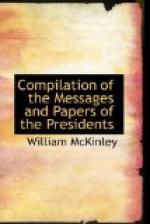That demand, although, as above shown, officially made known to the Spanish envoy here, was not delivered at Madrid. After the instruction reached General Woodford on the morning of April 21, but before he could present it, the Spanish minister of state notified him that upon the President’s approval of the joint resolution the Madrid Government, regarding the act as “equivalent to an evident declaration of war,” had ordered its minister in Washington to withdraw, thereby breaking off diplomatic relations between the two countries and ceasing all official communication between their respective representatives. General Woodford thereupon demanded his passports and quitted Madrid the same day.
Spain having thus denied the demand of the United States and initiated that complete form of rupture of relations which attends a state of war, the executive powers authorized by the resolution were at once used by me to meet the enlarged contingency of actual war between sovereign states. On April 22 I proclaimed a blockade of the north coast of Cuba, including ports on said coast between Cardenas and Bahia Honda, and the port of Cienfuegos, on the south coast of Cuba,[14] and on the 23d I called for volunteers to execute the purpose of the resolution.[15] By my message of April 25 the Congress was informed of the situation, and I recommended formal declaration of the existence of a state of war between the United States and Spain. [16] The Congress accordingly voted on the same day the act approved April 25, 1898, declaring the existence of such war from and including the 21st day of April,[17] and reenacted the provision of the resolution of April 20 directing the President to use all the armed forces of the nation to carry that act into effect.[18] Due notification of the existence of war as aforesaid was given April 25 by telegraph to all the governments with which the United States maintain relations, in order that their neutrality might be assured during the war. The various governments responded with proclamations of neutrality, each after its own methods. It is not among the least gratifying incidents of the struggle that the obligations of neutrality were impartially discharged by all, often under delicate and difficult circumstances.
In further fulfillment of international duty I issued, April 26, 1898, a proclamation announcing the treatment proposed to be accorded to vessels and their cargoes as to blockade, contraband, the exercise of the right of search, and the immunity of neutral flags and neutral goods under enemy’s flag.[19] A similar proclamation was made by the Spanish Government. In the conduct of hostilities the rules of the Declaration of Paris, including abstention from resort to privateering, have accordingly been observed by both belligerents, although neither was a party to that declaration.




